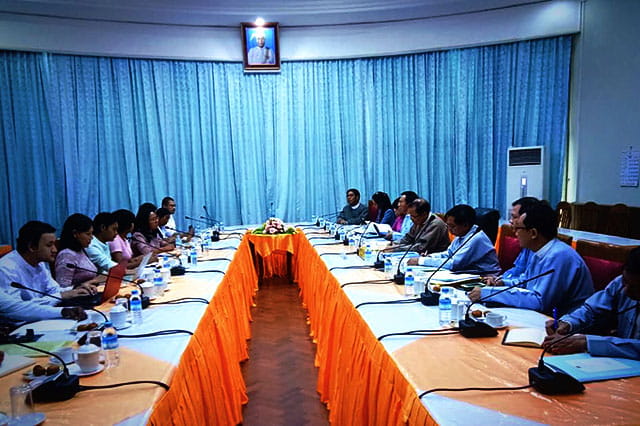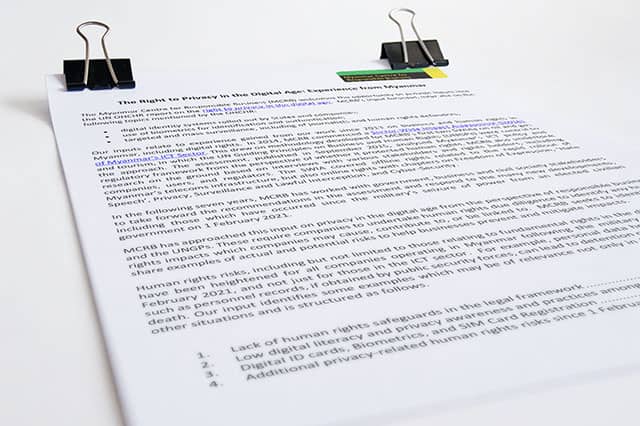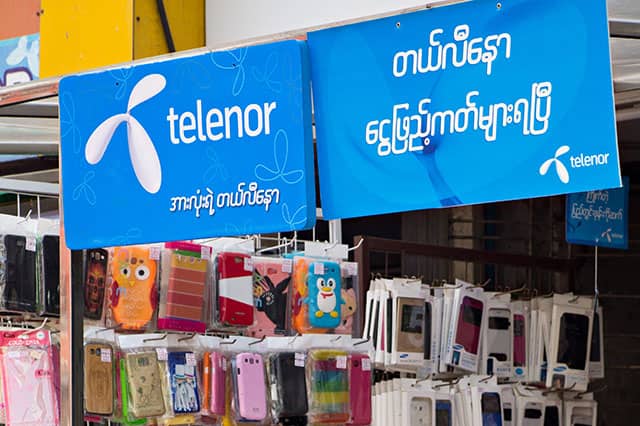MCRB joins Coalition for Telecom Law Reform on Advocacy Trip to Naypyidaw

On 22 June, Wai Phyo Myint, MCRB’s Regional Outreach Manager and another 10 organisations representing the 22 organisations in the Coalition for Telecoms Law Reform and the Abolition of Article 66(d) visited Naypyidaw to meet with Minister of Transport and Communications HE U Thant Sin Maung and senior Telecoms Ministry officials.
The coalition is seeking the removal of Article 66(d) from the Telecoms Law, as well as amendment to other provisions of the law with potential for impacts on the right to freedom of expression (Chapter 2 of MCRB’s 2015 Sector-Wide Impact Assessment on the Information and Communications Technology Sector identified a number of provisions which raise concerns from a human rights perspective).
The coalition is calling for an amending Law to be prepared (this something which will also be necessary as a complement to the forthcoming Bill establishing the Telecoms Regulator), and for this to be the subject of public consultation before it is submitted to Parliament.
The group presented the Minister with a statement outlining the reasons for reforming the law, which include the manner in which it has been used, and the impacts it has on freedom of expression, including media freedom. This in turn undermines the government’s stated commitment to human rights and the rule of law, including combatting corruption and holding businesses accountable. The coalition also presented ‘counterarguments’ to the various arguments made by others for retention of this provision, namely that provisions in the Penal Code, supported by the 2015 Electronic Evidence Act already cover all seven offences mentioned in the Article 66(d).
The coalition has been documenting use of Article 66(d) provision and collected details of 70 cases. These include 7 cases under the previous government and 63 cases under NLD government. Out of 70 cases, 7 involved claims that the defendant had defamed the military, 6 involved suits by NLD members and MPs, and 8 by third parties accusing the defendant of "defaming Aung San Suu Kyi." Ten of the 70 cases involve journalists (a total of 17 individual journalists).
The Telecommunications Ministry, who are required under Article 80(b) of the Law to authorise its use, has received 166 cases. According to the Ministry, 140 were personal cases not involving public figures. In 19 of the other 26 cases involving public figures, a third party rather than the allegedly defamed individual had filed the suit. In only 7 cases had the alleged victim of defamation pursuing the case themselves.
The coalition also met 11 members of the Amyotha Hluttaw Bill Committee, led by its Secretary Dr. Myat Nyana Soe.
The press release for the advocacy trip (in Burmese) is available.
အထက်ပါအကြောင်းအရာနှင့်ပတ်သတ်၍ ဆက်လက်ဖတ်ရှုလိုပါက
- Information and Communication Technologies (ICT) Sector and Digital Rights
- MCRB မှ ဒစ်ဂျစ်တယ်ခေတ်တွင် ပုဂ္ဂိုလ်ဆိုင်ရာလွတ်လပ်ခွင့်နှင့်ပတ်သက်၍ OHCHR သို့ အကြံပြုချက် ထည့်သွင်းတင်ပြသည်
- MCRB မှ နည်းပညာကဏ္ဍအတွက် UNGPs ၏ လက်တွေ့ကျင့်သုံးမှုကို OHCHR သို့ အကြံပြုချက် ထည့်သွင်းတင်ပြသည်
- ဆိုက်ဘာလုံခြုံရေးဥပဒေ မူကြမ်းနှင့် သက်ဆိုင်သော နောက်ဆုံးပေါ်အခြေအနေနှင့် ယင်း၏ ဒစ်ဂျစ်တယ် အခွင့်အရေးနှင့် ဒစ်ဂျစ်တယ် စီးပွားရေးအပေါ် သက်ရောက်မှုများ
- မြန်မာနိုင်ငံ၏ဆိုက်ဘာလုံခြုံရေးဆိုင်ရာ ဥပဒေမူဘောင်အား နိုင်ငံတကာစံချိန်စံနှုန်းများနှင့်အညီ တည်ဆောက်ရန် လိုအပ်သည်
 English
English မြန်မာ
မြန်မာ မြန်မာ (unicode)
မြန်မာ (unicode)











